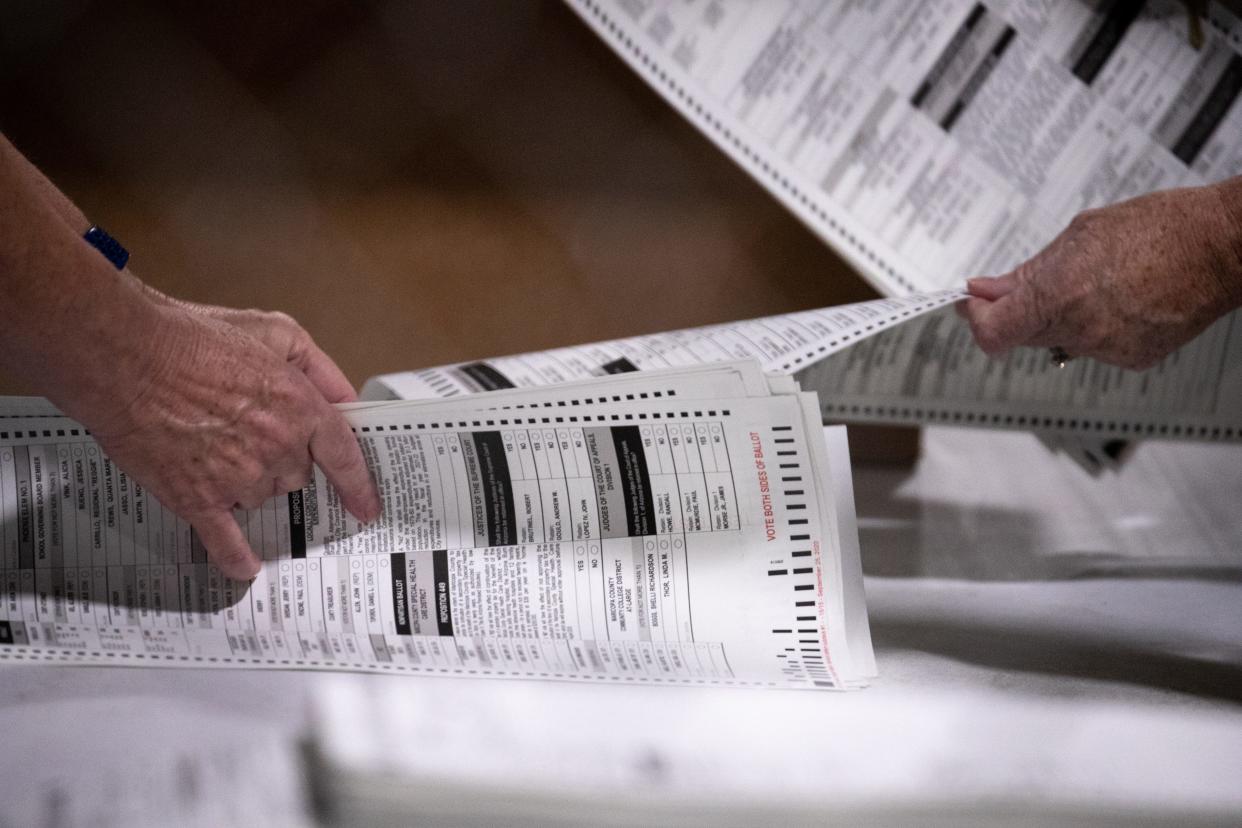This ballot measure could change the election game. But will the result be the same?

The campaign to change Arizona's primary election system has raised nearly $5.5 million to get on the 2024 ballot, organizers said Tuesday.
The announcement came as nomination petitions for the Make Elections Fair Act are hitting the streets in hopes of gathering 383,923 valid signatures by the July 3 deadline to qualify for the ballot.
The ballot measure seeks to eliminate the state's partisan primary system and replace it with a system in which every voter can vote in every election, regardless of party affiliation or lack of affiliation.
Campaign chair Sarah Smallhouse said the idea is to appeal to Arizona's independents, the state's largest voting bloc at 34.7% of voter registrations.
Despite their numbers, Smallhouse said independents cannot vote in primaries unless they take the extra step of requesting a partisan ballot.
They also face other roadblocks, she added. Independent candidates who are not part of an organized party must gather far more signatures than their partisan counterparts when circulating nomination petitions.
The changes could be significant. Smallhouse said similar efforts in other states have made primaries more competitive and changed the outcome of the general election.
If voters approve the ballot measure, changes would be embedded in the state constitution. Here's how the process would work:
All candidates for a given legislative or congressional seat compete in the same primary
All voters get to cast a ballot in the primary
The top winners of the primary advance to the November general election
The act leaves it to the Legislature to determine how many of the primary candidates can move to the general election, from a minimum of two candidates to a maximum of five
If the Legislature does not act, the duty to make a determination on the number of candidates falls to the Arizona secretary of state
If there are more than two candidates who get to the general election ballot, voters would be asked to rank their choices
The campaign is rolling out as another initiative drive, which seeks to create a ranked-choice voting system with stricter guidelines than Make Elections Fair, has also signaled it will attempt to qualify for the ballot.
'One of the most dramatic changes that has happened in Arizona'
The system is not a new concept. It's similar to what many cities use, said Paul Johnson, a businessman and a former Phoenix mayor.
"It will be one of the most dramatic changes that has happened in Arizona," Johnson said at Tuesday's news conference.
Thirty years ago, he led the drive that gave independents the right to vote in a partisan primary — as long as they took that extra step to request a partisan ballot. But Johnson said as the independent ranks have swelled, it's time to give them, as well as voters registered with a party, a chance to choose among all candidates in a primary.
Terry Goddard, the former state attorney general and Phoenix mayor, called the act the "second step" in election reform. The first step, he said, came last fall when voters approved a citizen initiative that requires disclosure of what formerly were anonymous campaign donations. He led the drive for Proposition 211.
Also promoting the act was Beau Lane, an advertising executive who lost to Mark Finchem in the GOP race for secretary of state last year. Lane said the current primary system too often results in a general election ballot that comes down to a choice "of the lesser of two evils."
While he said he didn't know if the Make Elections Fair Act would have changed the outcome of his 2022 race, he said he's confident Karrin Taylor Robson would be governor today if it was in place last year. Lane said that's because she would have given voters an alternative to Kari Lake and Katie Hobbs.
Chuck Coughlin, the strategist working on the campaign, said the $5.5 million should cover 90% of the funds needed to qualify for the ballot.
Campaign finance reports show the effort, as of Sept. 20, had raised $1.95 million for Open Primaries Now, a nonprofit that was formed to support the ballot measure.
Hickman Family Farms made a corporate contribution of $50,000 to the effort. Glenn Hickman, the company's president, made an individual donation of $2,000. Maricopa County Supervisor Clint Hickman, a Republican, is a member of the Hickman family.
Coughlin said the campaign has 35 major donors who have given $10,000 or more, although most of them were not listed in the campaign's most recent finance report because their donations came after the filing deadline.
Records show former U.S. Sen. Dennis DeConcini, a Democrat, gave $10,000 to the campaign in September.
Reach the reporter at [email protected] or at 602-228-7566 and follow her on Threads as well as on X, the platform formerly known as Twitter @maryjpitzl.
Support local journalism. Subscribe to azcentral.com today.
This article originally appeared on Arizona Republic: Open primaries: Ballot measure seeks changes to Arizona elections
